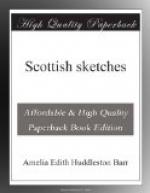In the early part of March two large ships lay off the coast waiting for them, and they went in a body to Crawford Keep to bid the chief “farewell.” It was a hard hour, after all, to Crawford. The great purpose that he had kept before his eyes for years was not at that moment sufficient. He had dressed himself in his full chieftain’s suit to meet them. The eagle’s feather in his Glengary gave to his great stature the last grace. The tartan and philibeg, the garters at his knee, the silver buckles at his shoulder, belt, and shoon, the jewelled mull and dirk, had all to these poor fellows in this last hour a proud and sad significance. As he stood on the steps to welcome them, the wind colored his handsome face and blew out the long black hair which fell curling on his shoulders.
Whatever they intended to say to him, when they thus saw him with young Colin by his side they were unable to say. They could only lift their bonnets in silence. The instincts and traditions of a thousand years were over them; he was at this moment the father and the chief of their deepest affection. One by one they advanced to him. He pressed the hands of all. Some of the older men—companions of his youth in play and sport—he kissed with a solemn tenderness. They went away silently as they came, but every heart was full and every eye was dim. There was a great feast for them in the clachan that night, but it was a sombre meeting, and the dominie’s cheerful words of advice and comfort formed its gayest feature.
The next day was calm and clear. The women and children were safely on board soon after noon, and about four o’clock the long boats left the shore full of men. Tallisker was in the front one. As they pulled away he pointed silently to a steep crag on the shingly beach. The chief stood upon it. He waved his bonnet, and then the long-pent feelings of the clan found vent in one long, pitiful Gallic lament, O hon a rie! O hon a rie! For a few moments the boats lay at rest, no man was able to lift an oar. Suddenly Tallisker’s clear, powerful voice touched the right chord. To the grand, plaintive melody of St. Mary’s he began the 125th Psalm,
“They in the Lord that firmly trust
shall be like Sion hill,
Which at no time can be removed,
but standeth ever still.
As round about Jerusalem
the mountains stand alway;
The Lord his folk doth compass so
from henceforth and for aye.”
And thus singing together they passed from their old life into a new one.
Colin had been indignant and sorrowful over the whole affair. He and Helen were still young enough to regret the breaking of a tie which bound them to a life whose romance cast something like a glamour over the prosaic one of more modern times. Both would, in the unreasonableness of youthful sympathy, have willingly shared land and gold with their poor kinsmen; but in this respect Tallisker was with the laird.




